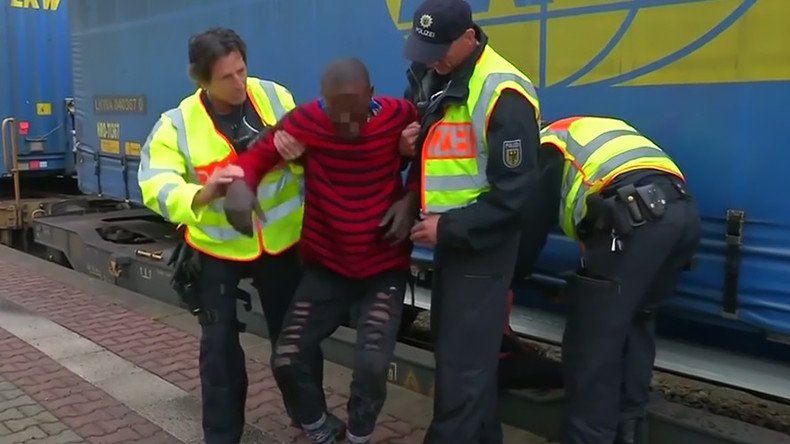‘Clear increase in stowaways’: 12 African migrants caught sneaking into Germany underneath train

German police have detained 12 men from Nigeria, Somalia and Ivory Coast, taking a risky hike underneath the cargo of a freight train originating in Italy. Officials say there has been a rise in stowaways after other entry points were tightened up.
READ MORE: 22.5% of German population have ‘migrant background’ – census
The men, aged between 16 and 29, boarded the Munich-bound freight train in Verona, in northern Italy, on the other side of the Alps, 400km to the south. They were found using heat-detection cameras, which were introduced at the German border station of Raubling last year.
A video showed several men being pulled out of a metal frame underneath the lorry containers mounted on the carriage, meaning they were offered little protection as the train swept through the mountains at a speed of up to 150km an hour.

"They're freezing cold and in a poor physical state," said local police spokesman Rainer Scharf. "We have already called the emergency services because we believe some of them are suffering from hypothermia."
One of the migrants appeared to be unable to walk, while all were handed blankets and taken to a nearby medical center, where the men, none of whom have presented any identification papers, will be registered.

Such detections have been a daily occurrence in Raubling through the week, with almost all of the migrants male, most from Africa, and several suffering from serious ailments, including infectious skin diseases and undiagnosed fevers.
"That's a clear increase, because in the first half of the year we only found 20 people in total,” said the official.
A total of 890,000 immigrants arrived in Germany in 2015, and 280,000 last year, with fewer expected to make it this year, due to tighter policing, less generous provisions, and a resettlement scheme.
The decrease is in part due to a tougher line on migrants taken by the German government, which faced widespread criticism for insisting on a controversial “open door” policy at the height of the refugee influx.
READ MORE: ‘Monitor children too’: German minister urges lower age limit for surveillance
A spate of high-profile terrorist attacks that hit Germany last year, such as the Berlin truck attack perpetrated by a rejected Tunisian asylum seeker, the attack on a bar in the Bavarian city of Ansbach by a Syrian refugee and a train rampage in Wurzburg carried out by a teenage asylum seeker from Afghanistan, prompted the German authorities to step up surveillance and speed up deportations.
In May, the German parliament drew criticism from human rights groups by passing regulations allowing authorities to monitor the cell and phone data of migrants in order facilitate their identification and restrict the freedom of movement of the rejected asylum seekers to ensure their swift deportation.
In June, Bavarian Interior Minister Joachim Herrmann proposed to lower the age limit for surveillance nationwide to include children as young as 12 years old, citing the increasing number of attacks carried out by radicalized teenagers.
READ MORE: German media failed to objectively report refugee crisis, sided with govt agenda – study
This week, Germany resumed sending asylum seekers back to Greece. The Greek authorities say, however, that have agreed to a return of only “a small number” of asylum seekers from the European countries, including Germany.
Meanwhile, a recent study revealed that the German media is underreporting the refugee problem. The study compiled by the Hamburg Media School and the University of Leipzig found that the mainstream German media generally sided with the government and turned a blind eye to popular opinion and the expert community in covering the issue. The report was based on the analysis of articles published between February 2015 and March 2016.
According to government statistics, 22.5 percent of Germany’s population, over 18 million people, are now of migrant background, meaning that at least one of their parents was born outside the country. About 740,000 people living in Germany are of African origin.













